Glass 4K Blu-ray Movie
HomeGlass 4K Blu-ray Movie 
4K Ultra HD + Blu-ray + Digital CopyUniversal Studios | 2019 | 129 min | Rated PG-13 | Apr 16, 2019
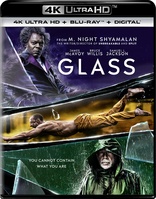
Movie rating
6.6 | / 10 |
Blu-ray rating
| Users | 4.2 | |
| Reviewer | 4.0 | |
| Overall | 4.0 |
Overview
Glass 4K (2019)
Following the conclusion of Split, Glass finds Dunn pursuing Crumb’s superhuman figure of The Beast in a series of escalating encounters, while the shadowy presence of Price emerges as an orchestrator who holds secrets critical to both men.
Starring: James McAvoy, Bruce Willis, Samuel L. Jackson, Anya Taylor-Joy, Sarah PaulsonDirector: M. Night Shyamalan
| Sci-Fi | Uncertain |
| Comic book | Uncertain |
| Thriller | Uncertain |
| Drama | Uncertain |
Specifications
Video
Video codec: HEVC / H.265
Video resolution: 4K (2160p)
Aspect ratio: 2.39:1
Original aspect ratio: 2.39:1
Audio
English: Dolby Atmos
English: Dolby TrueHD 7.1 (48kHz, 24-bit)
Spanish: Dolby Digital 5.1
French (Canada): Dolby Digital 5.1
Subtitles
English SDH, French, Spanish
Discs
Blu-ray Disc
Two-disc set (2 BDs)
Digital copy
4K Ultra HD
Packaging
Slipcover in original pressing
Playback
Region free
Review
Rating summary
| Movie | 4.0 | |
| Video | 5.0 | |
| Audio | 5.0 | |
| Extras | 2.5 | |
| Overall | 4.0 |
Glass 4K Blu-ray Movie Review
Reviewed by Martin Liebman April 6, 2019While Marvel and DC are battling it out for box office returns, littering the movie landscape with, now, nearly countless Superhero films that all basically play to the same beat in increasingly grim and trope-filled narratives with an ever-expanding character count of decades-old names and faces, M. Night Shyamalan has taken his time to craft his own, much more grounded, and in many ways more engaging and intimate "Superhero" and "Super villain" stories. Unbreakable introduced audiences to David Dunn (Bruce Willis) and Mr. Glass (Samuel L. Jackson), physical opposites that were seemingly born for conflict with one another. Shyamalan's Split revealed that film's antagonist, a man suffering from a unique twist on multiple personality disorder known as "The Horde" (James McAvoy), to be part of the Dunn/Glass world. The director brings their stories together in Glass, a film that is far less concerned with action and instead built on characterization and both introducing and dissecting the worlds of comic book heroes and villains in a believably approachable and innately human way. Though it is not his best film, Glass is a fitting continuation of the saga with an end that both closes one chapter of the story and opens a world of possibilities for future films.
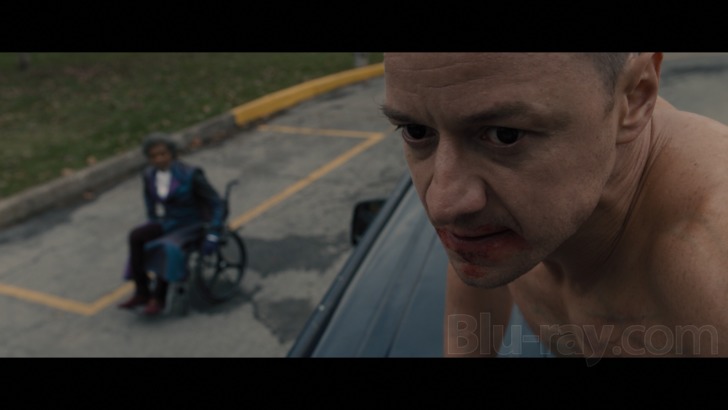
"The Horde" -- the violent abductor with severe multiple personality disorder who targets teenage girls -- has struck again. He has kidnapped four cheerleaders, holding them in an abandoned Philadelphia warehouse. David Dunn, the "unbreakable" man known to the public as the mysterious hooded hero "Overseer," tracks him and the girls down, rescues the victims, and finds himself in a violent confrontation with The Horde's most dangerous form, the vascular, muscular creature known as "The Beast." The two of them are eventually taken into custody and hospitalized under the care of Dr. Ellie Staple (Sarah Paulson) who believes the men are suffering from an ailment that leads them to believe they are something they are not. Also in her care is Dunn's arch nemesis, the fragile but extraordinarily intelligent Mr. Glass. Staple is hellbent on proving her theory correct and is prepared to go to extraordinary lengths to ensure none of the men leave the hospital the same.
Glass is not a film focused on action but rather one focused on character depth. It's not a film about maneuverings but rather about manipulations. Shyamalan's script thrives on opening characters, revealing truths, with slowly developing and gradually revealed turns and twists. The story centers on the three main characters -- Dunn, Glass, and The Horde -- but it is in many ways the story of the supposed support players, prominently Dr. Staple but also Joseph (Spencer Treat Clark), Casey (Anya Taylor-Joy), and Mrs. Price (Charlayne Woodard). Shyamalan does not make it their movie through sleight-of-hand but it's clear by the time the second act begins, with the collected characters under Staple's care at the hospital, that the story is not going to evolve down a more traditional genre avenue. The film does build towards a climactic showdown with the three of them in the middle of it, but even within it the physical confrontations are less dynamic and dramatic than the character details and reveals. Shyamalan has built the movie with purpose that is revealed in the end, which may not be a traditional "twist" as the term applies to the filmmaker's movies. It's instead a gradual reveal through and beyond the film's unexpected climax that rewrites the characters, their purpose, and the state of the world Shyamalan has constructed around them.
Shyamalan builds and executes the film with a slow but sure hand. There are lengthy stretches featuring Dunn and Glass doing little more than sitting still while Staple speaks to them, diagnoses them, and lays out a "treatment" plan for their mental blocks and fantasies, as she believes them to be. There's more interaction with The Horde, unavoidable with the multiple personalities surfacing in response to any given situation or stimulus, but that allows the series' anchors -- Dunn and Glass -- to reveal their place and purpose in the film with added mystery as they are slowly folded into a much larger narrative. Staple is the film's most interesting character. As the film explores the parallels and demarcations between fictional and "real" heroes and villains and various comic book tropes are introduced and often slyly rather an overtly folded into the story, it becomes clear that there's something to Staple's work beyond "treating" the men's supposed aliments. Shaymalan builds the film, much as he always does, with the greater purposes and truths masked and slowly peeled away at opportune times. Staple indeed becomes something more than just a stand-in, and a second watch proves much more rewarding than the first, allowing viewers to piece together the story as Shyamalan introduces hints rather than wait for the reveals, to understand where the characters and the story are going with the foresight to better appreciate the artistry in the writer/director's purposes for it all.
Glass 4K Blu-ray Movie, Video Quality 

The included screenshots are sourced from a 1080p Blu-ray disc. Watch for 4K screenshots at a later date.
Glass' 2160p/HDR enhanced UHD presentation generally rates as a moderate-to-major boost over the perfectly rated
1080p Blu-ray. Universal's presentation is sourced from what is reportedly a 4K digital intermediate (though the film was shot at a
resolution of 3.4K per the same source). Generally, both detail and color find improvement in every scene. At its best, the image soars above the
Blu-ray, particularly in character close-up, revealing breathtakingly complex and intimate skin details that the 1080p image cannot render with
anywhere near this much clarity. Take a look at the scene in the "pink room" in
chapter 10. There are some striking character portraits to be seen, close-ups that reveal not more detail but sharper and
more refined
detail. David Dunn's white stubble, for instance, has a tack-sharp look about, revealing each individual strand with amazing clarity. Likewise, wrinkles,
pores, and Staple's makeup and hair in the scene all find a fairly significant boost in sharpness and clarity. All four characters earn close-up screen time
in this scene, each of them much more complex than their 1080p counterparts. Such holds true for the duration. Choose any shot, scene, or sequence
and find a UHD that offers perceptible and purposeful textural increases that serve the movie well, particularly with the number of near actor head-on
shots
Shyamalan incorporates into the film.
Colors are more rich as well, finding greater tonal depth and accuracy. Circling back to that pink room, the walls
find a shade that's deeper, more precise, more stabilized in reinforcing the tonal messaging Shyamalan carefully builds in the scene, partly through the
color. But every shade is likewise the beneficiary of improved depth, more finely tuned contrast, and more intensity. Lighter colors and whites in
particular reveal greater brilliance while blacks showcase added depth over the Blu-ray without crushing details. Skin tones are healthy and precise as
well. There's a strange shimmering artifact, or perhaps a weird compression issue, on Shyamalan's shirt when he is seen making his reprise cameo
around the 10-minute mark. It is also present on the Blu-ray (which I did not see when watching that version) but is more obvious on the UHD.
Otherwise, this one is
problem-feee and a real looker of a UHD.
Glass 4K Blu-ray Movie, Audio Quality 
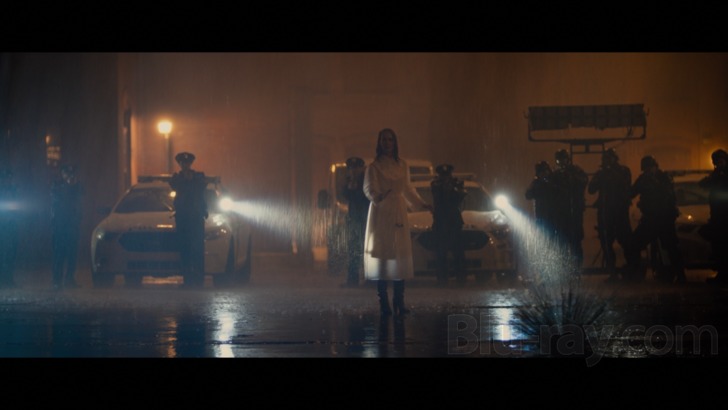
Glass shatters through speakers with a terrific Dolby Atmos soundtrack. While the track isn't one of those sorts to feature wall-to-wall mayhem, it folds in both high yield effects with subtle atmospherics and dialogue remarkably well. Every occurrence of soundtrack stretch and engagement are top-notch. Thunder cracks behind, and overhead, in chapter three. There's a natural, well defined bustle in a school cafeteria in chapter five. A "growling"-type sound effects plays at the 59-minute mark when Jospeh is searching the web. The effect seems to move through portions of the stage with ferocious depth. Listeners will enjoy terrific low end response to various slams and punches into a myriad of surfaces during the climax. Bass is powerfully engaged in support of music and sound effects alike to the tune of some of the most well pronounced examples one will find while also maintaining balance and integrity with other elements. Music flows freely along the front and engages the rears in balance, while dialogue is clear, well prioritized, and center focused with a few good examples off reverberation as the situation allows.
Glass 4K Blu-ray Movie, Special Features and Extras 
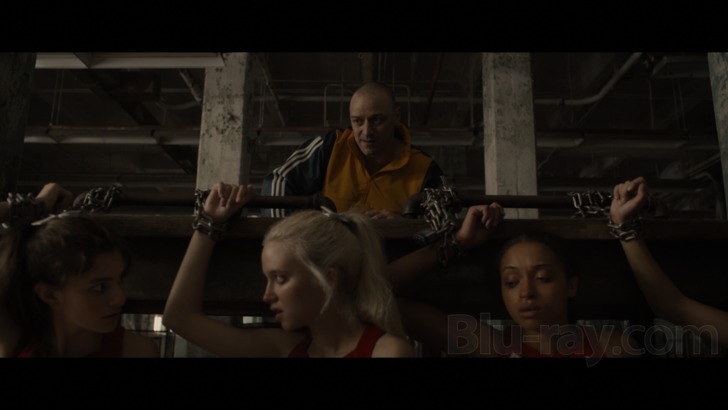
Glass' UHD disc contains deleted scenes, an alternate opening, and a dozen featurettes, most of which are of the typically short, sub 3-minute
variety
common
in Universal releases. A Blu-ray copy of the film and a Movies Anywhere digital copy code
are included with purchase. This release ships with an embossed slipcover.
- Alternate Opening (2160p/SDR, 2:57 with intro, 2:13 without intro): With optional M. Night Shyamalan introduction.
- Deleted Scenes (2160p/SDR, 24:53 total runtime with intros, 13:36 without intros): Included are David Alone at Bar, Patricia Talks to Cheerleaders, David Encounters Pierce, Casey in Art Class, Dr. Staple Explains Machine, Mrs. Price in Waiting Room, Mrs. Price Talks to Elijah, Dr. Staple Drinks Tea, Pierce Checks Elijah's Room, Mrs. Price Tells Elijah About Surgery, David Submits to Dr. Staple, and Patients Worship The Beast. With optional M. Night Shyamalan introductions.
- The Collection of Main Characters (2160p/SDR, 8:43 total runtime): Brief character portraits that also explore the qualities the actors bring to the roles. Included are David Dunn, Elijah Price, Kevin Wendell Crumb, and The Rest of the Family.
- A Conversation with James McAvoy and M. Night Shyamalan (2160p/SDR, 5:10): The actor and writer/director cover a few basics, including the film's genre, the film's tone, character evolutions, transitioning from Split to Glass, and more.
- Brining the Team Back Together (2160p/SDR, 2:54): A quick, sincere exploration of the camaraderie and longstanding relationships on Shyamalan sets.
- David Dunn vs. The Beast (2160p/SDR, 2:11): A short look at making some of the action highlights from the climax while on a budget.
- Glass Decoded (2160p/SDR, 2:52): Shyamalan discusses props that return to this film. It also explores the series' and this film's color palette.
- Breaking Glass: The Stunts (2160p/SDR, 1:28): As the title suggests, this brief extra explores one of the film's stunts in a most broad perspective.
- Connecting the Glass Universe (2160p/SDR, 2:54): How the films tie together, narratively and tonally alike.
- M. Night Shyamalan: Behind the Lens (2160p/SDR, 2:46): Cast and crew talk up Shyamalan's direction.
- The Sound of Glass (2160p/SDR, 1:50): Talking with Composer West Dylan Thordson.
- Enhancing the Spectacle (2160p/SDR, 2:53): Looking at a few of the film's key digital effects.
- Raven Hill Memorial (2160p/SDR, 2:16): Shooting at a real, albeit abandoned, mental hospital in Allentown, Pennsylvania.
- Night Vision (2160p/SDR, 1:56): A look at how Shyamalan sees and builds a film from the beginning.
Glass 4K Blu-ray Movie, Overall Score and Recommendation 
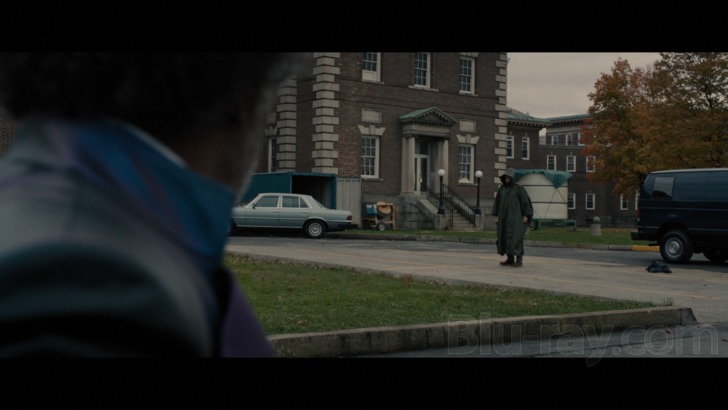
Glass both brings Shyamalan's Unbreakable trilogy to a close while also igniting a new spark with an opportunity for the filmmaker to play into a whole new wide world, should he so choose. This film builds and plays internally much more than it does externally, and it's a welcome escape from so many of the more superficial (yet often still very good) superhero movies which are so dominant across today's cinema. Shyamalan certainly seems to be back in a groove. He's too talented to miss too often, and here's hoping there much more good Shyamalan in store in the future. Universal's UHD release of Glass delivers a worthwhile improvement to detail and color over the Blu-ray. The audio presentation is excellent as well and a voluminous collection of short extras are included. Highly recommended.
Other editions
Glass: Other Editions

Glass
2019

Glass
2019

Glass 4K
Exclusive Packaging / 3 Collectible Character Art Cards
2019

Glass
2019

Glass
2019
Similar titles
Similar titles you might also like

Venom 4K
Limited Edition / Reprint
2018

Joker
2019

The Incredible Hulk
2008

Hulk 4K
2003

Life
2017

V for Vendetta 4K
2005

Luke Cage: The Complete First Season
2016

The Darkest Minds
2018

A Quiet Place
2018

Logan 4K
2017

Westworld: The Complete Series
2016-2022

Split 4K
2016

Black Panther 4K
Cinematic Universe Edition
2018

Rise of the Planet of the Apes
2011

Jessica Jones: The Complete First Season
2015

Push 4K
2009

Loki: The Complete Second Season 4K
Collector's Edition
2023

Agents of S.H.I.E.L.D.: The Complete Second Season
2014-2015

Priest
Unrated
2011

Iron Man: Rise of Technovore
2013